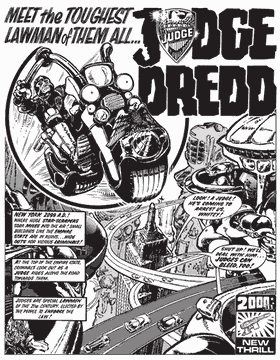
Comics opened up new possibilities and new thinking for me was when I was introduced to 2000 AD. Up to that point almost everything I had seen was really just a reaffirmation of the current world order.
Judge Dredd in particular was exactly what my young teenage mind needed. Initially he appeals to the lizard brain instincts that made action films of the 1980s appealing (Paul Verhoeven’s RoboCop, Total Recall, and Starship Troopers are works of parodic genius). His brutalist approach to law and order and justice was straightforward and easy to understand. Eventually, my 14-year-old mind was able to see that this was just a manifestation of the old adage about how “every complex problem has a simple solution, and it is wrong”.
This was quite possibly my first introduction to the concept of parody, let alone questioning the current world order. 2000 AD also produced strips that were more accessible (the Celtic, magickal, berserker Slàine being one example that still stays with me) but Judge Dredd was the one that really stuck out. Perhaps it was because 2000 AD is a British publication that it felt perfectly fine to be poking fun at 80s Reagan America. There was certainly legitimate cause for concern about how unquestioningly Britain was towing that particular line. The appearance of Brit Cit and Mega City One in the Judge Dredd universe very much mirrored the relationship between the US and UK in the 80s.

Unfortunately, the two film adaptations of Judge Dredd (1995’s Judge Dredd and 2012’s Dredd) did not live up to the spirit of the 2000 AD comics. Perhaps in a world where Poe’s Law has broken the fourth wall this kind of comic seems like a relic of the past. In the meantime, me and my 14-year-old self will still have that feeling of subversion and questioning the world order.

